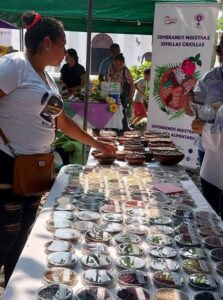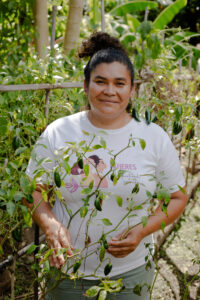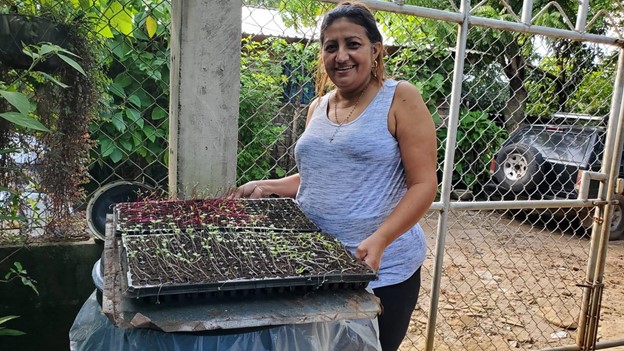
We are pleased to share with our Mary’s Pence community the annual report of Concertación de Mujeres de Suchitoto.
Concertación de Mujeres de Suchitoto is the largest of our ESPERA partners, with over 300 members from primarily rural communities surrounding Suchitoto, El Salvador. They have been an ESPERA partner since 2008. Concertación works through lenses of reproductive and sexual health, economic solidarity, institutional strength, and women’s rights. Additionally, they are advancing food sovereignty and promoting a solidarity economy by strengthening local food production and consumption in El Salvador.
In their report, Concertación de Mujeres de Suchitoto had a plan of action that encapsulates the four strategies of the ESPERA Program: Economic Autonomy Through Strong Economic Initiatives, Strengthening Women’s Organizations, Family Farming and Emotional Wellness. Concertación focused on ESPERA’s first strategy of Economic Autonomy Through Strong Economic Initiatives in their plan of action. They conducted business skills workshops for 20 women entrepreneurs, covering essential topics such as business planning, market analysis, accounting, and financial management. This training is especially crucial given recent money laundering laws that are creating new standards for small businesses in El Salvador.
ESPERA’s second strategy, Strengthening Women’s Organizations, was illustrated through events like the “Women Sharing Knowledge” workshop. This event brought together 50 women leaders from multiple municipalities to discuss critical issues including food costs, climate change, and women’s economic empowerment. Participants shared medicinal plant uses and healthy recipes, ultimately collecting enough material to produce a recipe book.
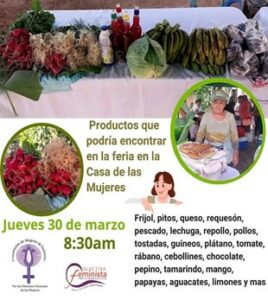
The ESPERA Program’s third strategy, Family Farming, aims to ensure food security through collaborative local production. Concertación launched a comprehensive campaign to promote organic production, local consumption, and environmental stewardship. This included creating educational materials to raise awareness about responsible consumption and support women’s economic development.
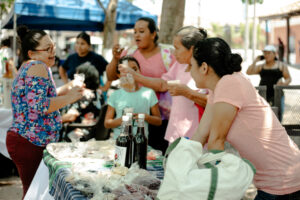
Monthly local fairs were established to showcase organically harvested products, including dairy, fruits, vegetables, and artisanal breads. From February to October 2023, ten fairs were held at the Suchitoto Casa de Mujeres, with four additional community markets in San Antonio, La Mora, Ichanquezo, and Palo Grande. Approximately 20 women participated in each fair, organizing and promoting local products.
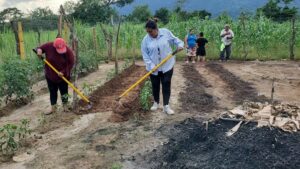 Additionally, Concertación supported women producers from four communities: Sitio Nuevo, Cereto, Sitio Cenicero and Saint Anita. They provided technical assistance to 28 women, making site visits to help develop chemical-free, agroecological orchards. The women learned to treat orchard soil using organic materials like ash and lime.
Additionally, Concertación supported women producers from four communities: Sitio Nuevo, Cereto, Sitio Cenicero and Saint Anita. They provided technical assistance to 28 women, making site visits to help develop chemical-free, agroecological orchards. The women learned to treat orchard soil using organic materials like ash and lime.
A key component of Concertación’s work involves preserving ancestral agricultural knowledge through learning exchanges and seed festivals. The women of Suchitoto coordinated with several local organizations including CORDES, a feminist collective, and the Ministry of Agriculture and Livestock, with support from Mary’s Pence. The project funded promotional materials and facilitated access to The National Center for Agricultural and Forestry Technology’s (CENTA) seed laboratory. Through this collaboration with CENTA and the Suchitoto women, participants discovered many native Creole seeds – varieties that many young people today are unfamiliar with. Concertación participated in the seed exchange with women from Suchitoto, Tonaca, Aguilares, Téjute, Cinquera, and Tenancingo, helping preserve native plants and heirloom varieties for future generations.

Through these multifaceted initiatives, Concertación de Mujeres de Suchitoto has made significant strides in supporting women’s economic autonomy, preserving traditional agricultural practices, and promoting sustainable local economies.
